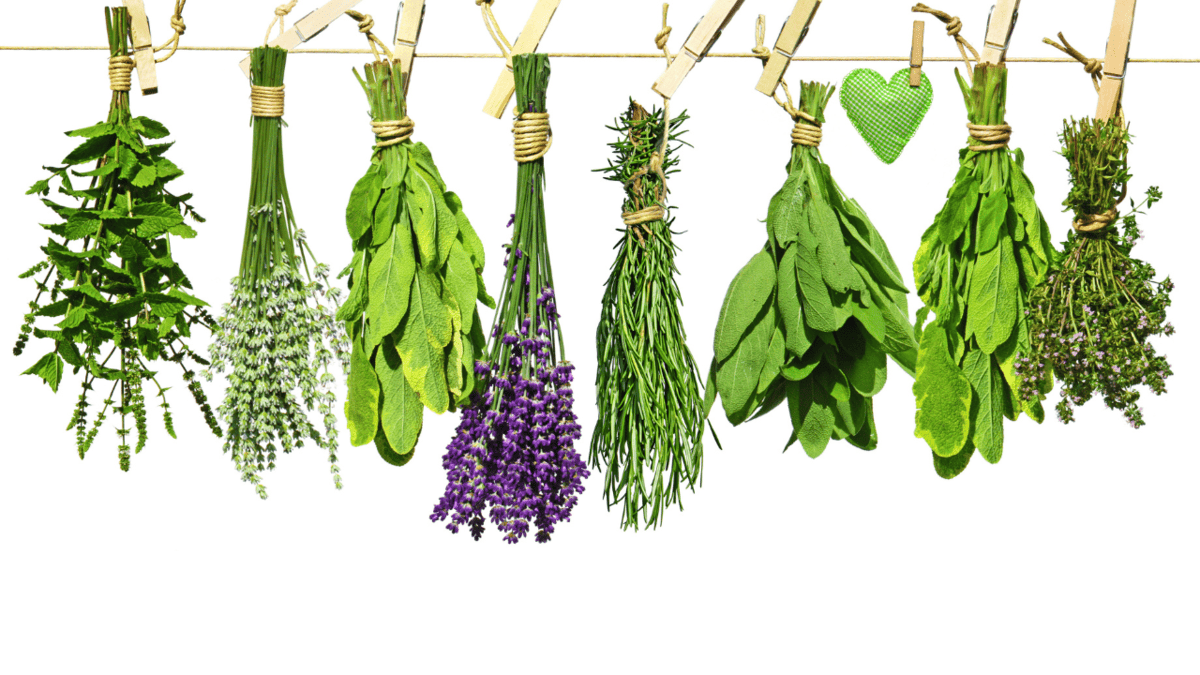Step into the captivating world of biblical herbs, where hidden treasures await! Join me on an extraordinary journey as we unlock the secrets of herbs mentioned in the Bible. Brace yourself for a remarkable exploration of their significance in ancient times, spanning from their mouthwatering culinary uses to their extraordinary healing properties. Discover the enchanting symbolism behind these herbs, and how they continue to resonate in our modern world. Get ready to be inspired and amazed by the rich heritage of herbs in the Bible. Are you ready to embark on this captivating adventure? Let’s dive in!
The Symbolism of Herbs in the Bible
Within the sacred texts, herbs are not mere plants; they carry the weight of healing, restoration, and spiritual significance. As we delve into the depths of biblical references, we will unearth the secrets behind herbs as symbols of physical and spiritual well-being. So, let us uncover the hidden meanings that herbs hold within the pages of the Bible.
Symbols of healing and restoration

In ancient times, when modern medicine was unavailable, people turned to herbs for healing and restoration. The Bible mentions herbs for their therapeutic properties, reflecting their remarkable ability to bring balance to the body and soul.
Herbs addressed not only physical ailments but also spiritual afflictions. Hyssop, a frequently mentioned herb, symbolized cleansing and renewal. It purified individuals and spaces, promoting inner transformation and a pure heart.
Frankincense, another renowned herb, had a profound impact on the mind, body, and spirit. Burning it as incense created a sacred atmosphere, carrying prayers to the divine. Its aromatic smoke purified the air and uplifted spirits.
The use of herbs extended beyond the physical realm, serving as powerful conduits for spiritual growth and rejuvenation. The biblical references to these herbs highlight their interconnectedness with our physical and spiritual selves.
Today, we value the healing potential of biblical herbs in culinary creations and natural remedies. These practices bridge the gap between ancient wisdom and our well-being, nurturing the body, mind, and spirit.
Symbol of provision and nourishment

In the depths of biblical texts, herbs emerge as symbols of provision and nourishment. The Bible emphasizes their significance in sustaining the body and spirit. Let’s embark on a captivating journey through biblical passages that illuminate the use of herbs for sustenance.
In Exodus, as the Israelites find themselves in the wilderness, longing for food, God provides manna from heaven. Alongside this heavenly provision, herbs like coriander seed are mentioned, infusing the nourishment with flavors and nutritional benefits.
The Promised Land, a land of abundance, features a rich harvest of herbs. Deuteronomy encourages the Israelites to appreciate the bounty, including wheat, barley, figs, pomegranates, and olives. These herbs not only satisfy hunger but also symbolize the blessings bestowed upon them.
Herbs go beyond physical nourishment; they symbolize spiritual sustenance. In Psalms, the righteous are compared to fruitful trees by streams of water, their leaves never withering. Just as trees draw sustenance from water, we find soul-nourishment through the wisdom and teachings in God’s word, akin to the herbs that sustain life.
Reflecting on these passages reveals the profound connection between herbs and well-being, both physical and spiritual. The herbs in the Bible not only provide sustenance but also serve as reminders of God’s faithfulness and provision—a testament to His abundant grace and care for His creation.
All the Herbs in the Bible:
Join me on a journey through the herbs mentioned in the Bible. Uncover their historical significance and health benefits. Walk through scripture, exploring the wisdom and cultural practices tied to these herbs. From aloes to saffron, each herb tells a unique story. Discover the hidden treasures and diverse uses of these biblical wonders. Let’s delve into the timeless wisdom and relevance of these extraordinary botanicals.
Aloes: Unlocking the Secrets of Ancient Embalming and Skin Care
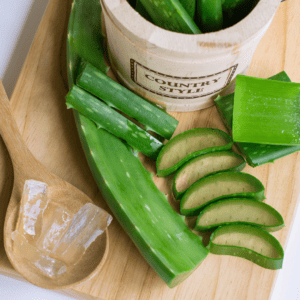
Aloe vera has a rich history dating back to ancient times. It was used in embalming practices to preserve the bodies of the deceased and ensure a smooth transition into the afterlife. Additionally, aloe vera’s aromatic scent made it a popular choice in perfumes, adding a touch of luxury to personal care products.
Today, we continue to benefit from the remarkable properties of aloe vera. Its gel is widely recognized for its ability to soothe and heal burns, including sunburns and skin irritations. When applied topically, aloe vera reduces inflammation and promotes the healing process, providing relief and comfort.
But the benefits of aloe vera extend beyond skincare. It has been used for centuries as a natural remedy for constipation due to its gentle laxative properties. By aiding in regular bowel movements, aloe vera promotes digestive health and overall well-being.
Excitingly, research suggests that aloe vera may have positive effects on blood sugar levels in individuals with type 2 diabetes. It shows promise in helping to regulate glucose levels and improve diabetic management. Additionally, preliminary studies indicate that aloe vera exhibits hepatoprotective properties, potentially mitigating liver damage caused by alcohol consumption.
Across time, aloe vera remains versatile and effective, from ancient embalming to modern uses. Its soothing properties, digestive support, and potential medicinal benefits contribute to its enduring value and legacy.
Anise: From Cooling High Temperatures to Soothing Coughs
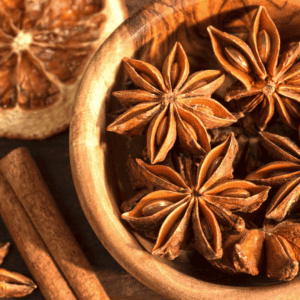
Anise, an herb cherished for its licorice-like flavor, has a long history of medicinal use. Join me as we explore its remarkable properties and value that has transcended generations.
In ancient times, anise was highly esteemed for its medicinal benefits. It was known for its ability to cool high temperatures and alleviate various ailments. Our ancestors utilized not just the seeds but also the leaves and stems of anise, harnessing its power in different forms.
Today, anise remains a treasured herb for its numerous advantages. It is widely recognized for its ability to promote digestion and relieve discomfort caused by indigestion and bloating. As an effective anti-flatulence agent, anise helps reduce gas and soothe digestive disturbances. It’s remarkable how this herb, revered by our ancestors for its digestive properties, continues to be relevant in our modern era.
Anise also shines in the realm of respiratory health. It has a longstanding tradition of soothing coughs and easing respiratory congestion. With its antispasmodic properties, anise proves valuable in addressing coughs, bronchitis, and even chronic obstructive pulmonary disease (COPD). Just as our ancestors relied on anise to calm respiratory ailments, we can still turn to it today for its comforting effects on our respiratory system.
Crushing anise seeds and brewing them into tea is a popular and convenient way to incorporate this herb into our routine. The aromatic and flavorful tea not only warms our senses but also provides relief for digestive issues and respiratory discomfort. It’s a simple and natural approach that our ancestors embraced, and one that we can continue to appreciate in our modern lives.
Balm or Balsam: The Fragrant Remedy from Gilead

In the Bible, balm or balsam is mentioned numerous times, evoking images of its exquisite fragrance and its association with the region of Gilead. This highly prized substance was considered extremely valuable and held a special place in ancient times. It was even brought by the Ishmaelites to Egypt, along with other precious spices and gifts.
Balm or balsam, an aromatic resin extracted from plants, held immense value for its scent and healing properties. In biblical times, people utilized its soothing properties for medicinal purposes and purification rituals. The balm or balsam of Gilead was highly prized for its potential therapeutic benefits.
In the present day, the biblical balm’s influence endures, inspiring herbalists and artisans to create homage-infused salves and oils. They blend ancient wisdom with modern advancements, carrying forward the knowledge of generations.
Herbal salves and oils inspired by the biblical balm continue to captivate the senses with their aromatic essences. Crafted with natural ingredients, they aim to provide soothing and nourishing properties to the skin, just as the balm of Gilead was revered for its healing virtues in ancient times.
Whether you seek relief from dry skin, minor irritations, or simply wish to indulge in the luxurious experience of ancient aromas, these contemporary interpretations of the biblical balm offer a delightful fusion of tradition and innovation.
Bitter Herbs: Culinary Delights with Digestive Benefits

In the book of Exodus, bitter herbs played a significant role during the sacred Passover celebration. They symbolized the bitter experience of slavery and the sweetness of liberation. Today, we discover that bitter herbs offer more than symbolism—they provide incredible benefits for our digestive health. Herbs like gentian and wormwood can prevent and relieve digestive complaints by stimulating digestion and improving blood circulation in the abdominal organs.
Beyond digestive benefits, bitter herbs also possess antimicrobial properties that fight harmful bacteria and parasites. They can stimulate the liver and gallbladder, aiding in the breakdown of fats. Incorporating these herbs into our daily lives is simple. We can enjoy them as a tea by crushing their seeds or leaves and steeping them in hot water. This warm infusion soothes discomfort and promotes digestive wellness.
When encountering bitter herbs on our plates, we should remember their rich biblical history and the incredible benefits they offer. Embrace their unique flavors and savor their digestive prowess. As Exodus 12:8 says, “They shall eat the flesh that same night, roasted with fire, and they shall eat it with unleavened bread and bitter herbs.” Let us appreciate the wisdom passed down through generations and relish the goodness that bitter herbs bring to our culinary delights and digestive health.
Cassia: Anointing Oil and Natural Hair Care
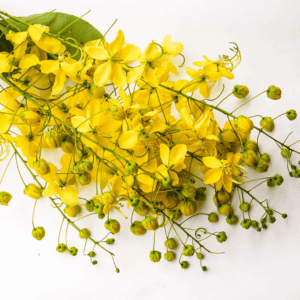
cassia is mentioned in various contexts, often intertwined with anointing rituals and the art of consecration. In the book of Exodus, we read, “Take the following fine spices: 500 shekels of liquid myrrh, half as much of fragrant cinnamon, 250 shekels of fragrant calamus” (Exodus 30:23). Here, cassia is believed to be the “fragrant cinnamon” mentioned, highlighting its aromatic properties and its use in anointing oil for sacred ceremonies.
Cassia, beyond anointing rituals, brings remarkable benefits to natural hair care and conditioning. Anciently, cassia leaves were dried and ground into a powder for hair treatment. Today, it remains a popular natural choice for vibrant and healthy hair.
When applied topically, cassia can strengthen the hair shaft, promote hair growth, and add natural shine. It is particularly effective in treating damaged hair, as it contains compounds that nourish and moisturize the hair follicles. Additionally, cassia is known for its ability to condition the scalp and combat common hair concerns like dandruff and scalp irritation.
To incorporate cassia into your hair care routine, you can create a simple hair mask by mixing cassia powder with warm water to form a smooth paste. Apply this paste to your hair, ensuring even coverage from roots to tips. Leave it on for about 30 minutes to an hour, allowing the nutrients to penetrate the hair strands. Then, rinse thoroughly with warm water.
It’s important to note that cassia should not be confused with cassia oil, which is derived from a different plant and has different properties. Cassia powder, made from the dried leaves of the cassia plant, is the preferred form for hair care applications.
Cinnamon: Precious Bark with Medicinal Marvels
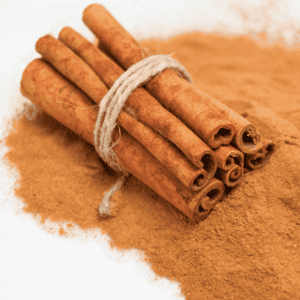
Cinnamon, the versatile spice, offers numerous benefits beyond its delicious flavor. If you struggle with diabetes or prediabetes, cinnamon can become your ally in regulating blood glucose levels, improving insulin sensitivity, and aiding in diabetes management. It acts as a gentle supporter, promoting balanced blood sugar naturally.
But the benefits of cinnamon extend further. With its powerful antifungal properties, it becomes an effective weapon against fungal infections such as athlete’s foot or yeast infections. Cinnamon’s natural antifungal abilities come to the rescue, providing relief and combating these common ailments.
Additionally, cinnamon is known for its soothing effects on digestive issues. If you often experience indigestion, bloating, or post-meal discomfort, cinnamon can bring much-needed relief. It acts as a gentle aid, easing the digestive process and promoting comfort. Sprinkling cinnamon can replace the need for after-dinner mints, enhancing your digestive well-being.
Beyond its healing properties, cinnamon’s warm and inviting flavor adds a delightful touch to various culinary creations. It enriches hot chocolate, herbal tea, baked goods, and savory dishes like curries and stews. The versatility of cinnamon knows no bounds, making it a beloved ingredient in diverse recipes.
Cinnamon’s historical significance and modern relevance are truly remarkable. From anointing oil to blood sugar regulation and digestive soothing, embrace cinnamon’s magic. Let its fragrance and healing properties remind us of nature’s valuable gifts for well-being.
Cumin: Aromatic Seeds for Flavor and Diabetes Management
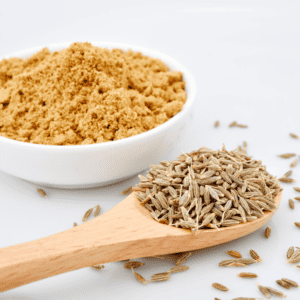
Just as it played a vital role in the kitchens of the ancient Israelites, cumin continues to be cherished for its distinct flavor and versatility. Beyond its culinary charm, cumin has shown potential health benefits, particularly in managing diabetes and potentially fighting cancer.
Research has highlighted cumin’s potential in diabetes management. Its seeds contain cuminaldehyde, a compound that aids in regulating blood sugar levels. For those with type 2 diabetes, incorporating cumin into meals may offer a natural approach to controlling glycemic levels and enhancing overall diabetes management.
Excitingly, cumin may also possess anticancer properties. Bioactive compounds found in cumin, such as thymoquinone, have demonstrated promising effects against various cancer cells. Although further research is needed, cumin’s potential role in cancer treatment presents hope for future advancements in therapeutic approaches.
Embrace cumin’s rich history and health benefits in your culinary creations. Connect with ancient Israelites and explore its potential for diabetes management and cancer-fighting properties. Let cumin’s distinctive essence infuse your dishes while contributing to your well-being.
Frankincense: From Ceremonial Offerings to Healing Remedies
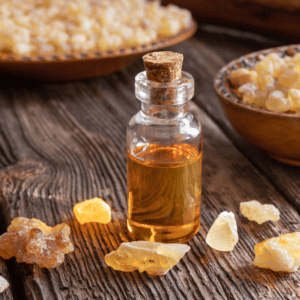
frankincense holds a special place in the Bible. It is mentioned in sacred rituals and offerings, making it a symbol of reverence and divine worship. In the book of Matthew, we read about the Magi presenting gifts of gold, frankincense, and myrrh to the newborn Jesus, signifying the preciousness of frankincense as an offering fit for the divine.
But frankincense is not only symbolically significant—it also possesses remarkable healing properties that have been cherished for centuries. Its anti-inflammatory effect is particularly noteworthy, as it can provide relief for various ailments. Derived from the resin of the Boswellia tree, frankincense contains compounds that help reduce inflammation in the body. This has made it valuable in traditional medicine for alleviating conditions like arthritis and asthma.
Additionally, frankincense has stress-reducing properties that can bring calmness to the mind. Inhaling its fragrance promotes relaxation and tranquility, making it a powerful tool for enhancing meditation, prayer, and spiritual practices. It sets the stage for serenity and focused contemplation.
When it comes to skincare, frankincense offers benefits too. Its soothing properties make it an excellent choice for calming irritated or inflamed skin. Conditions like eczema and acne can be relieved and healed through its application.
As we explore the world of frankincense, we are reminded of the wisdom found within the scriptures. In the book of Psalms, we encounter a beautiful verse that captures the essence of frankincense: “Let my prayer be set forth before thee as incense; and the lifting up of my hands as the evening sacrifice” (Psalm 141:2). This verse emphasizes the spiritual connection and sacredness that frankincense represents in our devotional practices.
Garlic: A Timeless Remedy for Health and Flavor
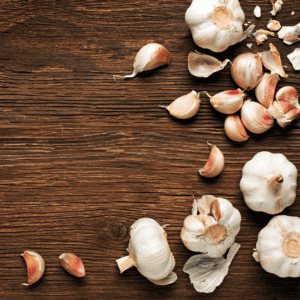
In Numbers 11:5, the Israelites fondly recall the flavors they enjoyed in Egypt, among them the beloved garlic. From ancient times to the present day, garlic has been treasured for its culinary delights and remarkable medicinal benefits.
Imagine standing amidst the majestic Egyptian pyramids, where garlic was highly regarded for promoting well-being and fending off ailments. Its usage dates back to those ancient times, and even today, we continue to harness its power for our health.
Garlic is a superhero when it comes to boosting the immune system. Packed with compounds like allicin, it possesses antimicrobial properties that help combat infections and strengthen our body’s defenses. Whether you’re warding off a pesky cold or aiming to fortify your immune system, garlic is a natural ally you can rely on.
But wait, there’s more! Studies have revealed that garlic can have a positive impact on heart health. It aids in lowering blood pressure and cholesterol levels, reducing the risk of cardiovascular diseases. The sulfur compounds found in garlic play a crucial role in preventing the formation of artery-clogging plaque, ensuring a healthy heart.
Moreover, garlic’s potential in fighting cancer is supported by research. Studies show that regular garlic consumption can lower the risk of stomach, colon, and breast cancer. Its antioxidants and anti-cancer properties make garlic a valuable ally in maintaining a cancer-preventive lifestyle.
Hyssop: Cleansing Rituals and Respiratory Support
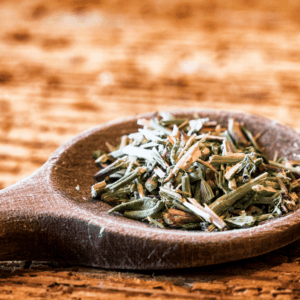
hyssop was prominently featured in various purification rituals. This humble herb was used to sprinkle water or blood for cleansing purposes, symbolizing the removal of impurities and sins. In fact, in Psalm 51:7, the writer says, “Purge me with hyssop, and I shall be clean; wash me, and I shall be whiter than snow.” The cleansing power of hyssop was believed to restore purity and spiritual well-being.
Beyond its role in purification, hyssop holds remarkable benefits for respiratory health. This herb has been traditionally used as a natural expectorant, assisting in the relief of coughs, bronchitis, and other respiratory ailments. Its aromatic properties help to loosen and expel phlegm, clearing the airways and promoting easier breathing.
Scientific research supports the traditional use of hyssop for respiratory support. Studies have shown that hyssop contains compounds with expectorant, antispasmodic, and antimicrobial properties. These properties aid in reducing congestion, soothing coughs, and providing relief from respiratory discomfort.
Moreover, hyssop enhances immune function, further supporting respiratory health. By bolstering the body’s defense mechanisms, hyssop may help protect against respiratory infections and aid in the recovery process.
To experience the benefits of hyssop for respiratory health, one common method is preparing a warm tea infusion. Simply steep dried hyssop leaves in hot water for several minutes, allowing the beneficial compounds to infuse into the liquid. You can sweeten the tea with honey or enjoy it as is, savoring the soothing warmth as it gently supports your respiratory system.
Mint: A Versatile Herb for Culinary and Medicinal Uses
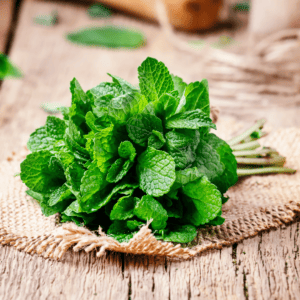
In the book of Matthew, Jesus rebuked the scribes and Pharisees, saying, “Woe unto you, scribes and Pharisees, hypocrites! For ye pay tithe of mint and anise and cummin” (Matthew 23:23). This verse suggests that mint was valued for its culinary use and was included in the tithes brought by the people.
In addition to its culinary significance, mint holds a special place in the world of herbal medicine. Mint has been cherished for centuries for its medicinal benefits, particularly its effects on digestion and headaches. When it comes to digestion, mint acts as a natural carminative, meaning it helps to soothe and calm the digestive tract. It can ease indigestion, bloating, and stomach discomfort, providing relief after a hearty meal.
Mint has the ability to alleviate headaches. The cooling and calming properties of mint can help ease tension and reduce the intensity of headaches. You can simply steep some fresh mint leaves in hot water to create a soothing tea or apply diluted mint essential oil to your temples for a refreshing relief.
But wait, there’s more! Mint doesn’t stop at digestive and headache benefits. It’s also been used to relieve symptoms of nausea, improve bad breath, and even aid in respiratory health. Mint’s aromatic properties can help open up the airways and promote easier breathing, making it a useful herb for individuals with respiratory conditions like asthma.
Mustard: The Parable of the Mustard Seed and Anti-Cancer Properties
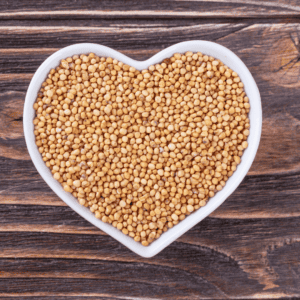
Jesus compared the Kingdom of Heaven to a tiny mustard seed that grows into a mighty tree, offering shelter to birds. It’s a captivating metaphor, revealing the power of transformation from something seemingly insignificant.
But here’s what makes it even more intriguing: mustard may hold potential health benefits, particularly in preventing cancer. Mustard seeds contain a compound called allyl isothiocyanate (AITC), which research suggests could fight cancer. Studies focusing on bladder cancer have shown that mustard seed powder, rich in AITC, can hinder the development and progression of this type of cancer. It’s remarkable how a small seed, like the mustard seed in Jesus’ parable, may hold promise in the battle against cancer.
Reflecting on this parable, we find a parallel between the transformative journey of the mustard seed and its potential to impact our health. It reminds us that even small choices, like incorporating mustard seeds into our diets, can have profound effects on our well-being.
Let’s explore practical ways to bring mustard into our lives. Mustard seeds, with their tangy and slightly spicy flavor, make a delightful spice in cooking. Just a sprinkle of these tiny powerhouses can enhance the taste of dishes. If you’re feeling adventurous, consider growing your own mustard greens, derived from the same plant. These greens add nutrition and can be enjoyed in salads or as a cooked side dish.
And let’s not forget mustard condiments! They’re perfect for sandwiches, hot dogs, and burgers, providing that extra zing to delight your taste buds.
As we contemplate the Parable of the Mustard Seed, let’s also appreciate the culinary delights and potential health benefits that mustard offers. It serves as a gentle reminder that even small choices in our daily lives can lead to remarkable transformations in both our meals and overall well-being.
Myrrh: Aromatic Resin with Medicinal Merits

In the Bible, myrrh occupies a prominent place as it receives honor through being brought by the wise men to the newborn Jesus. Additionally, the Song of Solomon compares its fragrance to the love shared between the bride and bridegroom. These biblical references demonstrate the high regard and significance given to myrrh in ancient times.
Ancient civilizations highly valued myrrh resin for its antiparasitic, antifungal, and antibacterial properties. They used it medicinally to address various ailments, including purifying the dead, treating skin conditions, and relieving respiratory issues. Myrrh resin’s remarkable healing abilities and infection-fighting qualities made it a prized substance in those times.
Interestingly, myrrh’s medicinal merits continue to be recognized today. Modern research has shed light on its antimicrobial properties, making it a valuable natural remedy against various parasites, fungi, and harmful bacteria. It has been studied for its potential in combating infections and supporting overall immune health.
In addition to its antimicrobial effects, myrrh also exhibits anti-inflammatory properties. It has been used topically to soothe skin irritations, accelerate wound healing, and reduce inflammation in conditions like gingivitis and gum disease. Its aromatic fragrance has a calming effect on the mind and spirit, adding to its therapeutic allure.
To experience myrrh’s benefits, you can find myrrh oil or resin in various forms, including essential oils, tinctures, and salves. These can be used topically for skin conditions, added to diffusers for a relaxing aroma, or even incorporated into oral hygiene practices.
As you explore the world of myrrh, may you appreciate its historical significance and embrace its modern applications. Just as this aromatic resin played a vital role in ancient rituals and healing practices, it continues to offer its medicinal merits in our quest for natural well-being.
Saffron: The Precious Spice with Healing and Culinary Uses

Saffron is truly a treasure. Its vibrant yellow hue and unique properties have made it highly sought after throughout history. People didn’t just appreciate saffron for its culinary delights; they also used it to create vibrant dyes for fabrics and for its various medicinal purposes. In the Song of Solomon, saffron is mentioned alongside other precious spices, further emphasizing its importance in ancient times.
Recent studies are shedding light on the potential health benefits of saffron, captivating researchers and health enthusiasts alike. Some research suggests that saffron may possess anti-cancer properties, particularly in relation to breast cancer. Compounds like crocin and crocetin found in saffron have been the focus of studies investigating their potential anticancer effects, raising hopes for future treatment options.
But the wonders of saffron don’t stop there. This aromatic spice has also shown promise in improving mood and reducing symptoms of depression. It’s been likened to a natural antidepressant, as it may increase levels of certain neurotransmitters that play a role in regulating mood.
Now, let’s explore saffron’s culinary prowess. Its distinct flavor and vibrant color have made it a cherished ingredient in cuisines around the world. Just a pinch of saffron can transform a dish, infusing it with an earthy, slightly floral essence. From savory rice dishes like paella to delightful desserts such as saffron-infused ice cream, saffron has found its place in a wide range of culinary creations.
So, whether you’re savoring the aroma of saffron-infused biryani or indulging in a cup of saffron-infused tea, this precious spice offers more than just delightful flavor. It carries a legacy of cultural significance, and as emerging research suggests, it may also hold potential health benefits that our ancestors intuitively understood. Embrace the wonders of saffron and discover the richness it can bring to your life.
Salt: The Essential Biblical Herb for Preservation, Cleansing, and Symbolic Meaning

In the Bible, salt holds significant meaning beyond its culinary uses. Jesus referred to His followers as the “salt of the earth,” emphasizing their role in bringing out the best in the world and adding godly wisdom to their interactions.
The “covenant of salt” mentioned in Leviticus symbolizes the everlasting nature of God’s promises, serving as a reminder of His faithfulness and the unbreakable bond between Him and His people.
People in ancient times used salt as a symbol of dedication in sacrificial offerings. It mirrored the call for individuals to offer their lives as living sacrifices with devotion and commitment.
In ancient times, when refrigeration was unavailable, salt had a crucial role in preserving food. People relied on it to prevent spoilage and decay, allowing them to enjoy meat for longer periods. As followers of Christ, we have a similar responsibility. We are called to be preservatives in society, upholding our values and shining a moral light amidst the surrounding decay.
Salt’s cleansing and purifying properties were integral to purification rituals. For instance, in 2 Kings, the prophet Elisha purified the waters of Jericho by casting salt into the spring, demonstrating salt’s transformative power and its ability to bring about restoration.
So, when considering the significance of salt in the Bible, we should remember our calling to be the “salt of the earth.” This entails bringing out the best in the world, preserving goodness, and sharing God’s love and wisdom with others.
Biblical Herbs Today

Imagine the incredible role herbs played in ancient cuisine, where they added depth and enhanced flavors to meals. Picture the aromatic combinations filling the air during feasts and special occasions. Mint, anise, coriander, cumin—these herbs skillfully infused traditional recipes, tantalizing our taste buds with their delightful tastes and fragrances. As we savor these flavors today, we’re reminded of the ancient roots connecting us to our biblical heritage.
But herbs were not solely confined to the kitchen; they had a sacred purpose in religious ceremonies and rituals. The tabernacle and temple exuded a divine aroma through the burning of incense, carrying prayers and offerings heavenward. Frankincense, myrrh, and other aromatic resins were meticulously blended, creating a heavenly scent that signified our reverence and devotion. The Scriptures beautifully capture this symbolism, like in Exodus 30:34-35, where God instructs Moses to combine specific herbs and spices to craft a sacred incense, pure and holy.
These ancient practices continue to resonate, finding echoes in our modern rituals and spiritual journeys. Today, we may incorporate burning herbs like sage or hyssop in purification rituals or mindfulness practices. As the smoke rises, we feel the connection between the physical and spiritual realms, cleansing our surroundings and evoking a sense of peace and sanctity.
By embracing these biblical herbs, we honor our heritage and tap into their profound symbolism and medicinal properties. Let’s appreciate the natural bounty these herbs provide and explore their potential for enhancing our well-being. Hyssop can help with respiratory health, and frankincense offers anti-inflammatory benefits. These herbs are still here to heal and support us, waiting to be embraced and integrated into our holistic approach to wellness.
The Significance of Herbs in the Bible Conclusion
the significance of herbs in the Bible holds an enduring legacy that continues to resonate in today’s world. These ancient plants offer us a rich heritage and wisdom waiting to be explored. From their practical applications in healing and nourishment to their symbolic and spiritual meanings, herbs have played a vital role in human life throughout history.
As we navigate our modern lives, it is important to remember the value of the natural world and the herbs that have been woven into our cultural tapestry. They bring delight to our senses, provide natural remedies, and deepen our spiritual connections. Moreover, scientific research unveils the remarkable properties and potential benefits of these herbs, reaffirming their relevance in our pursuit of holistic well-being.
I encourage you to embark on your own journey of discovery, delving into the biblical passages that mention these herbs. Embrace their wisdom, incorporate them into your daily life, and honor the interconnectedness between yourself, nature, and the divine. By appreciating the legacy of biblical herbs, we can find nourishment, healing, and a deeper sense of harmony in our lives.

